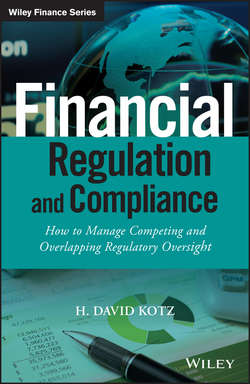Читать книгу Financial Regulation and Compliance - Kotz H. David - Страница 13
На сайте Литреса книга снята с продажи.
CHAPTER 1
Jurisdiction of Regulators – Who Regulates Whom and What
1.4 THE COMMODITY FUTURES TRADING COMMISSION (CFTC)
ОглавлениеThe SEC's counterpart for futures exchanges and brokers is the CFTC. The CFTC is an independent Agency of the United States government that regulates futures and options markets. The stated mission of the CFTC is “to protect market participants and the public from fraud, manipulation, abusive practices, and systemic risk related to derivatives – both futures and swaps – and to foster transparent, open, competitive and financially sound markets.”24 The CFTC states that it carries out this mission by “polic[ing] the derivatives markets for various abuses and works to ensure the protection of customer funds.”25
In carrying out this mission, the CFTC polices the derivatives markets for various abuses and works to ensure the protection of customer funds. The CFTC also oversees designated contract markets, swap execution facilities, derivatives clearing organizations, swap data repositories, swap dealers, futures commission merchants, commodity pool operators, and other intermediaries.
The CFTC is composed of three major divisions: Market Oversight, Clearing and Intermediary Oversight, and Enforcement. The CFTC's Division of Market Oversight ensures that the futures markets are operating efficiently without manipulation and fraud. These tasks are executed first by reviewing and analyzing the very diverse group of instruments and products to ensure that they are not susceptible to manipulation. Market Oversight also conducts active market and trade practice surveillance of trading activity on designated contract markets (known as “DCMs”), like the New York Mercantile Exchange. Traders establishing positions on DCMs are subject to reporting requirements so the CFTC can evaluate position sizes to detect and deter manipulation. Market Oversight monitors the activities of large traders, key price relationships, and relevant supply and demand factors for the estimated 1,400 active futures and option contracts in the country to ensure market integrity. In addition, CFTC surveillance economists prepare weekly summary reports for futures and option contracts approaching their expiration periods.
The CFTC's Division of Clearing and Intermediary Oversight ensures the financial integrity of transactions on the markets regulated by the CFTC. This division attempts to establish that the intermediaries managing these funds are properly registered, perform appropriate recordkeeping, have adequate capital, employ fair sales practices, and protect the funds their customers invest. Intermediaries overseen by the CFTC include futures commission merchants (“FCMS”), including banks and broker-dealers with specialized futures operations, as well as stand-alone futures trading houses.26
The CFTC's Division of Enforcement investigates and prosecutes violations of the federal laws governing commodity trading by individuals and firms who are engaged in activities that directly or indirectly affect commodity futures and option trading on domestic exchanges. These federal laws prohibit fraud and abusive practices in solicitations of futures or options, such as falsely guaranteeing profits, minimizing risk, and misrepresenting performance history. In addition, the CFTC is authorized to bring enforcement actions for misappropriating customer funds, and often refers matters to criminal authorities.27
The CFTC administers the Commodity Exchange Act (“CEA”), 7 U.S.C. section 1 et seq., which prohibits fraudulent conduct in the trading of futures contracts. The CEA also establishes a comprehensive regulatory structure to oversee the volatile futures trading markets. The CEA requires all FCMs to register with the CFTC, unless they qualify for a particular exemption.28 CFTC regulations promulgated pursuant to the CEA also require all registered FCMs to be a member of a Futures Association.29
24
See http://www.cftc.gov/About/MissionResponsibilities/index.htm.
25
See ibid.
26
For further background on the CFTC's Division of Clearing and Intermediary Oversight, see http://www.cftc.gov/About/CFTCOrganization/index.htm.
27
For further background on the CFTC's Division of Enforcement, see http://www.cftc.gov/LawRegulation/Enforcement/index.htm.
28
See 7 U.S.C. section 6d(a).
29
See CFTC Regulation 170.15.
